Record Keeping in Healthcare: Legislation and Regulations Report
VerifiedAdded on 2022/10/02
|20
|5033
|267
Report
AI Summary
This report delves into the critical aspects of record keeping within the healthcare sector. It begins by outlining key legislation and regulations, including the Data Protection Act 2018, Health and Social Care Act 2008, Freedom of Information Act 2000, and the General Data Protection Regulation (GDPR), emphasizing their impact on healthcare providers and the importance of compliance. The role of the Care Quality Commission (CQC) as an independent regulator is then discussed, highlighting its functions in monitoring, inspecting, and ensuring quality in health and adult care services. The consequences of non-compliance with these regulations, such as reputational damage and potential fines, are also examined, alongside the benefits of adherence. Furthermore, the report explores internal and external record-keeping requirements, detailing data storage methods and the significance of protecting patient information, as well as the processes for managing changes in legislation and regulations. The report also describes the different record-keeping systems used and the importance of patient data protection and the role of training in maintaining compliance. The report concludes by discussing the challenges and barriers to compliance and how they can be addressed.
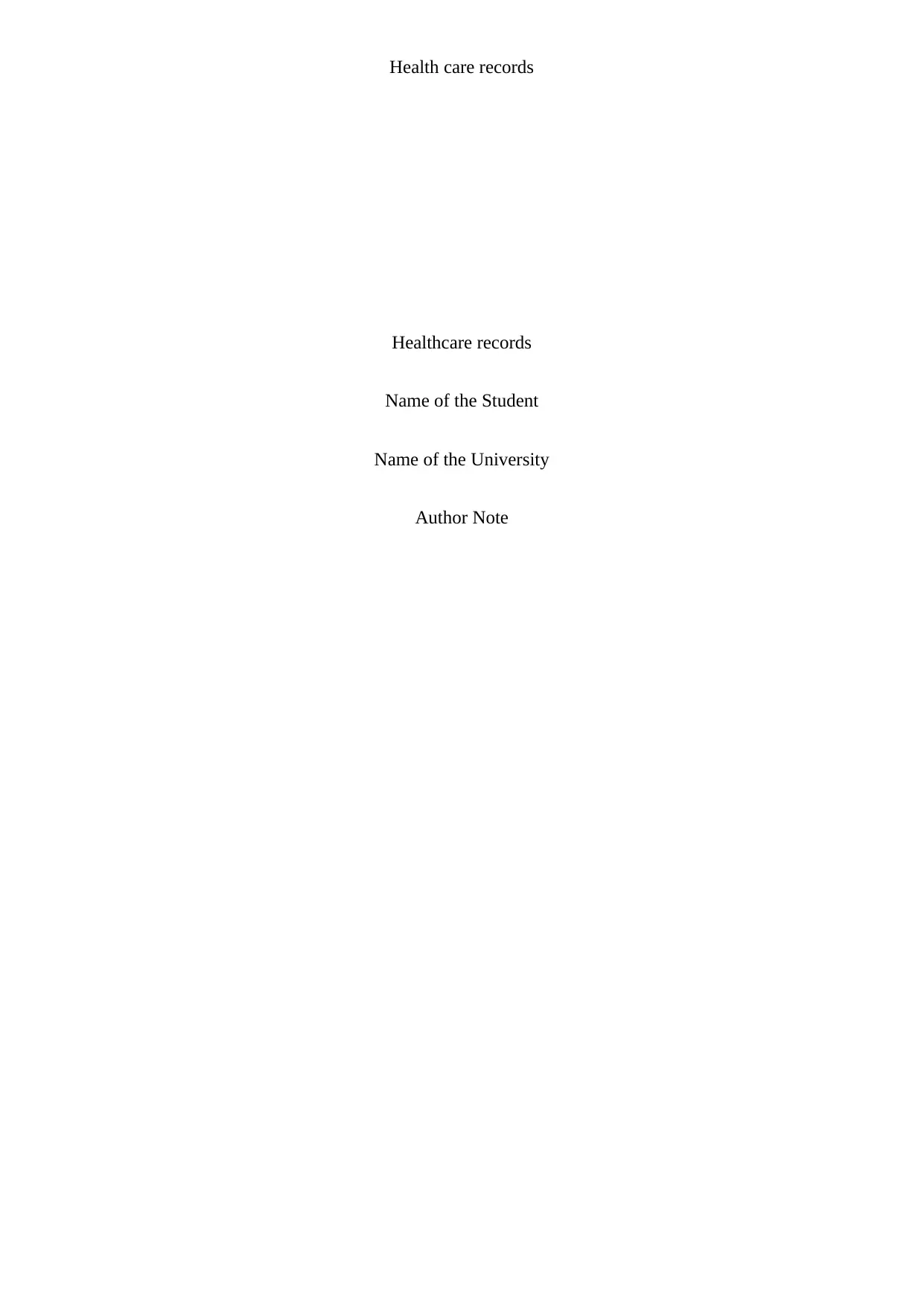
Health care records
Healthcare records
Name of the Student
Name of the University
Author Note
Healthcare records
Name of the Student
Name of the University
Author Note
Paraphrase This Document
Need a fresh take? Get an instant paraphrase of this document with our AI Paraphraser
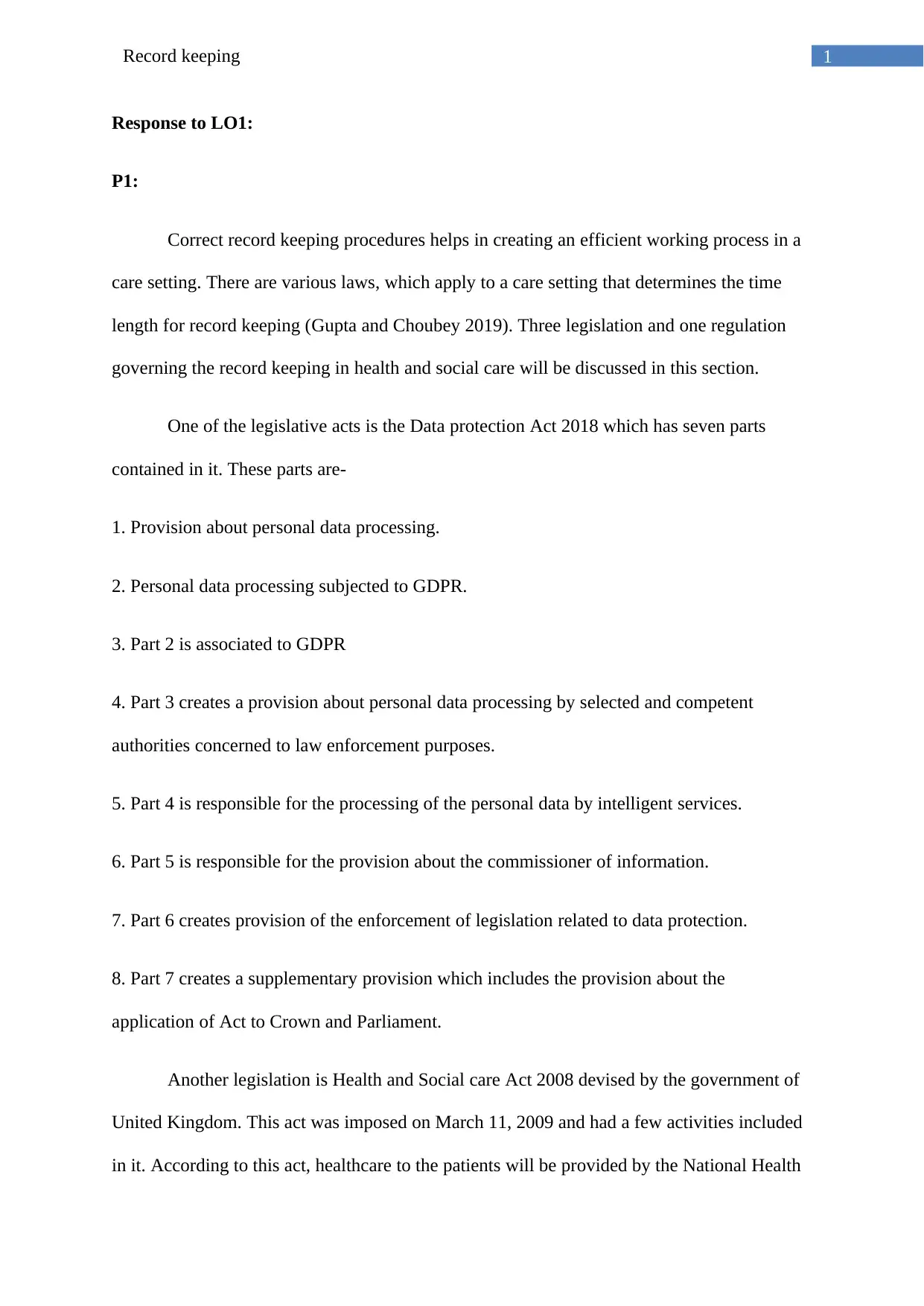
1Record keeping
Response to LO1:
P1:
Correct record keeping procedures helps in creating an efficient working process in a
care setting. There are various laws, which apply to a care setting that determines the time
length for record keeping (Gupta and Choubey 2019). Three legislation and one regulation
governing the record keeping in health and social care will be discussed in this section.
One of the legislative acts is the Data protection Act 2018 which has seven parts
contained in it. These parts are-
1. Provision about personal data processing.
2. Personal data processing subjected to GDPR.
3. Part 2 is associated to GDPR
4. Part 3 creates a provision about personal data processing by selected and competent
authorities concerned to law enforcement purposes.
5. Part 4 is responsible for the processing of the personal data by intelligent services.
6. Part 5 is responsible for the provision about the commissioner of information.
7. Part 6 creates provision of the enforcement of legislation related to data protection.
8. Part 7 creates a supplementary provision which includes the provision about the
application of Act to Crown and Parliament.
Another legislation is Health and Social care Act 2008 devised by the government of
United Kingdom. This act was imposed on March 11, 2009 and had a few activities included
in it. According to this act, healthcare to the patients will be provided by the National Health
Response to LO1:
P1:
Correct record keeping procedures helps in creating an efficient working process in a
care setting. There are various laws, which apply to a care setting that determines the time
length for record keeping (Gupta and Choubey 2019). Three legislation and one regulation
governing the record keeping in health and social care will be discussed in this section.
One of the legislative acts is the Data protection Act 2018 which has seven parts
contained in it. These parts are-
1. Provision about personal data processing.
2. Personal data processing subjected to GDPR.
3. Part 2 is associated to GDPR
4. Part 3 creates a provision about personal data processing by selected and competent
authorities concerned to law enforcement purposes.
5. Part 4 is responsible for the processing of the personal data by intelligent services.
6. Part 5 is responsible for the provision about the commissioner of information.
7. Part 6 creates provision of the enforcement of legislation related to data protection.
8. Part 7 creates a supplementary provision which includes the provision about the
application of Act to Crown and Parliament.
Another legislation is Health and Social care Act 2008 devised by the government of
United Kingdom. This act was imposed on March 11, 2009 and had a few activities included
in it. According to this act, healthcare to the patients will be provided by the National Health
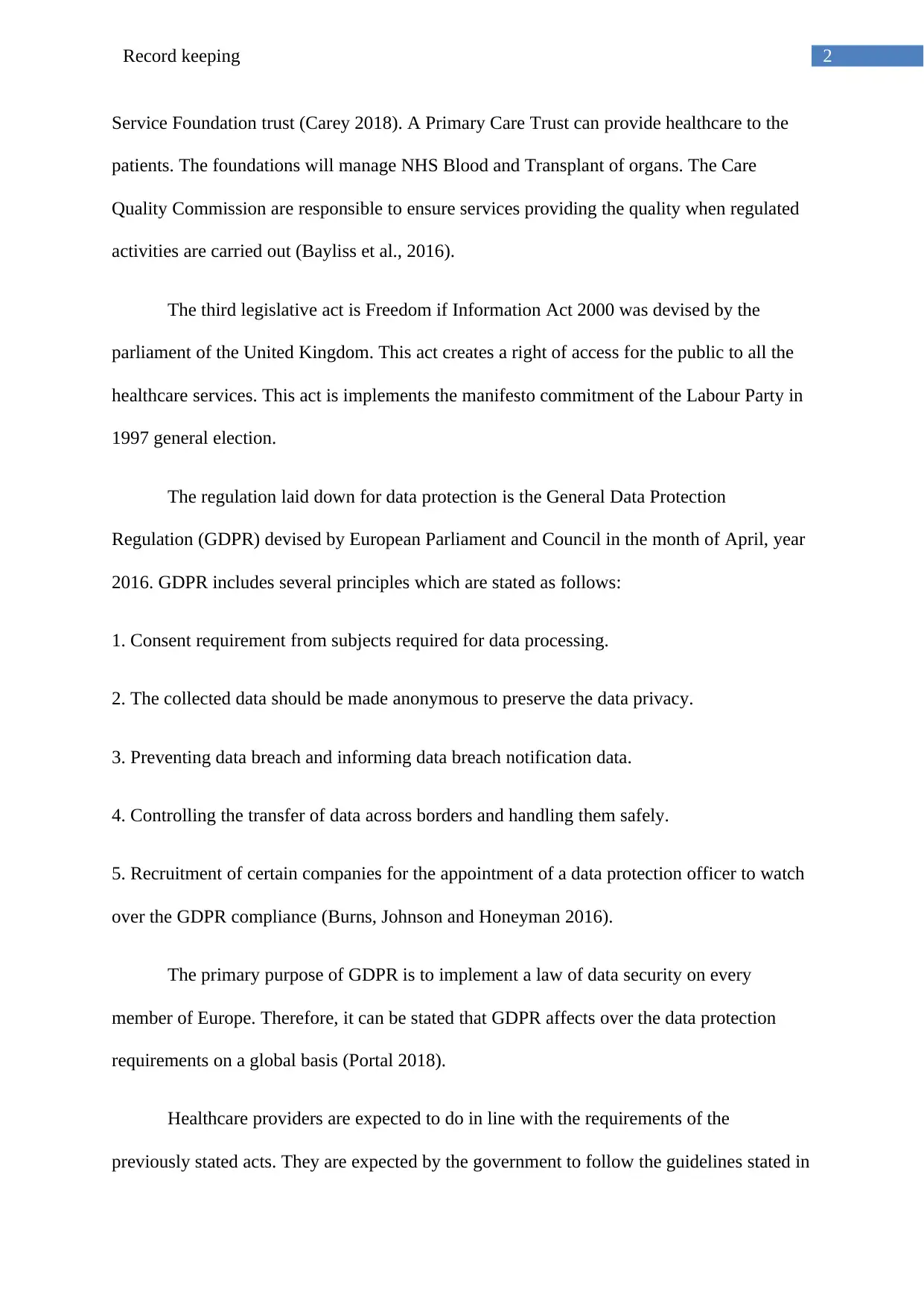
2Record keeping
Service Foundation trust (Carey 2018). A Primary Care Trust can provide healthcare to the
patients. The foundations will manage NHS Blood and Transplant of organs. The Care
Quality Commission are responsible to ensure services providing the quality when regulated
activities are carried out (Bayliss et al., 2016).
The third legislative act is Freedom if Information Act 2000 was devised by the
parliament of the United Kingdom. This act creates a right of access for the public to all the
healthcare services. This act is implements the manifesto commitment of the Labour Party in
1997 general election.
The regulation laid down for data protection is the General Data Protection
Regulation (GDPR) devised by European Parliament and Council in the month of April, year
2016. GDPR includes several principles which are stated as follows:
1. Consent requirement from subjects required for data processing.
2. The collected data should be made anonymous to preserve the data privacy.
3. Preventing data breach and informing data breach notification data.
4. Controlling the transfer of data across borders and handling them safely.
5. Recruitment of certain companies for the appointment of a data protection officer to watch
over the GDPR compliance (Burns, Johnson and Honeyman 2016).
The primary purpose of GDPR is to implement a law of data security on every
member of Europe. Therefore, it can be stated that GDPR affects over the data protection
requirements on a global basis (Portal 2018).
Healthcare providers are expected to do in line with the requirements of the
previously stated acts. They are expected by the government to follow the guidelines stated in
Service Foundation trust (Carey 2018). A Primary Care Trust can provide healthcare to the
patients. The foundations will manage NHS Blood and Transplant of organs. The Care
Quality Commission are responsible to ensure services providing the quality when regulated
activities are carried out (Bayliss et al., 2016).
The third legislative act is Freedom if Information Act 2000 was devised by the
parliament of the United Kingdom. This act creates a right of access for the public to all the
healthcare services. This act is implements the manifesto commitment of the Labour Party in
1997 general election.
The regulation laid down for data protection is the General Data Protection
Regulation (GDPR) devised by European Parliament and Council in the month of April, year
2016. GDPR includes several principles which are stated as follows:
1. Consent requirement from subjects required for data processing.
2. The collected data should be made anonymous to preserve the data privacy.
3. Preventing data breach and informing data breach notification data.
4. Controlling the transfer of data across borders and handling them safely.
5. Recruitment of certain companies for the appointment of a data protection officer to watch
over the GDPR compliance (Burns, Johnson and Honeyman 2016).
The primary purpose of GDPR is to implement a law of data security on every
member of Europe. Therefore, it can be stated that GDPR affects over the data protection
requirements on a global basis (Portal 2018).
Healthcare providers are expected to do in line with the requirements of the
previously stated acts. They are expected by the government to follow the guidelines stated in
⊘ This is a preview!⊘
Do you want full access?
Subscribe today to unlock all pages.

Trusted by 1+ million students worldwide
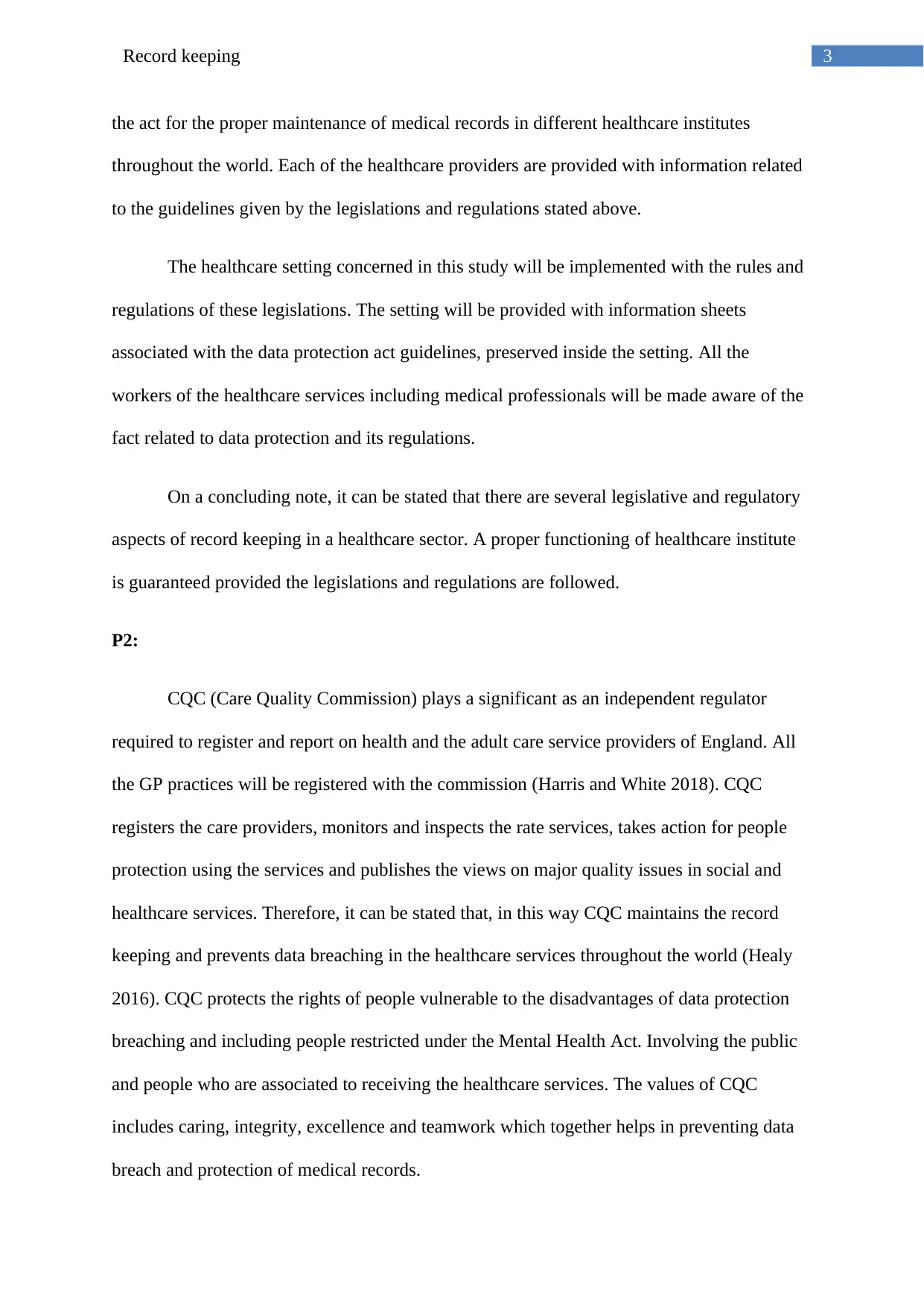
3Record keeping
the act for the proper maintenance of medical records in different healthcare institutes
throughout the world. Each of the healthcare providers are provided with information related
to the guidelines given by the legislations and regulations stated above.
The healthcare setting concerned in this study will be implemented with the rules and
regulations of these legislations. The setting will be provided with information sheets
associated with the data protection act guidelines, preserved inside the setting. All the
workers of the healthcare services including medical professionals will be made aware of the
fact related to data protection and its regulations.
On a concluding note, it can be stated that there are several legislative and regulatory
aspects of record keeping in a healthcare sector. A proper functioning of healthcare institute
is guaranteed provided the legislations and regulations are followed.
P2:
CQC (Care Quality Commission) plays a significant as an independent regulator
required to register and report on health and the adult care service providers of England. All
the GP practices will be registered with the commission (Harris and White 2018). CQC
registers the care providers, monitors and inspects the rate services, takes action for people
protection using the services and publishes the views on major quality issues in social and
healthcare services. Therefore, it can be stated that, in this way CQC maintains the record
keeping and prevents data breaching in the healthcare services throughout the world (Healy
2016). CQC protects the rights of people vulnerable to the disadvantages of data protection
breaching and including people restricted under the Mental Health Act. Involving the public
and people who are associated to receiving the healthcare services. The values of CQC
includes caring, integrity, excellence and teamwork which together helps in preventing data
breach and protection of medical records.
the act for the proper maintenance of medical records in different healthcare institutes
throughout the world. Each of the healthcare providers are provided with information related
to the guidelines given by the legislations and regulations stated above.
The healthcare setting concerned in this study will be implemented with the rules and
regulations of these legislations. The setting will be provided with information sheets
associated with the data protection act guidelines, preserved inside the setting. All the
workers of the healthcare services including medical professionals will be made aware of the
fact related to data protection and its regulations.
On a concluding note, it can be stated that there are several legislative and regulatory
aspects of record keeping in a healthcare sector. A proper functioning of healthcare institute
is guaranteed provided the legislations and regulations are followed.
P2:
CQC (Care Quality Commission) plays a significant as an independent regulator
required to register and report on health and the adult care service providers of England. All
the GP practices will be registered with the commission (Harris and White 2018). CQC
registers the care providers, monitors and inspects the rate services, takes action for people
protection using the services and publishes the views on major quality issues in social and
healthcare services. Therefore, it can be stated that, in this way CQC maintains the record
keeping and prevents data breaching in the healthcare services throughout the world (Healy
2016). CQC protects the rights of people vulnerable to the disadvantages of data protection
breaching and including people restricted under the Mental Health Act. Involving the public
and people who are associated to receiving the healthcare services. The values of CQC
includes caring, integrity, excellence and teamwork which together helps in preventing data
breach and protection of medical records.
Paraphrase This Document
Need a fresh take? Get an instant paraphrase of this document with our AI Paraphraser
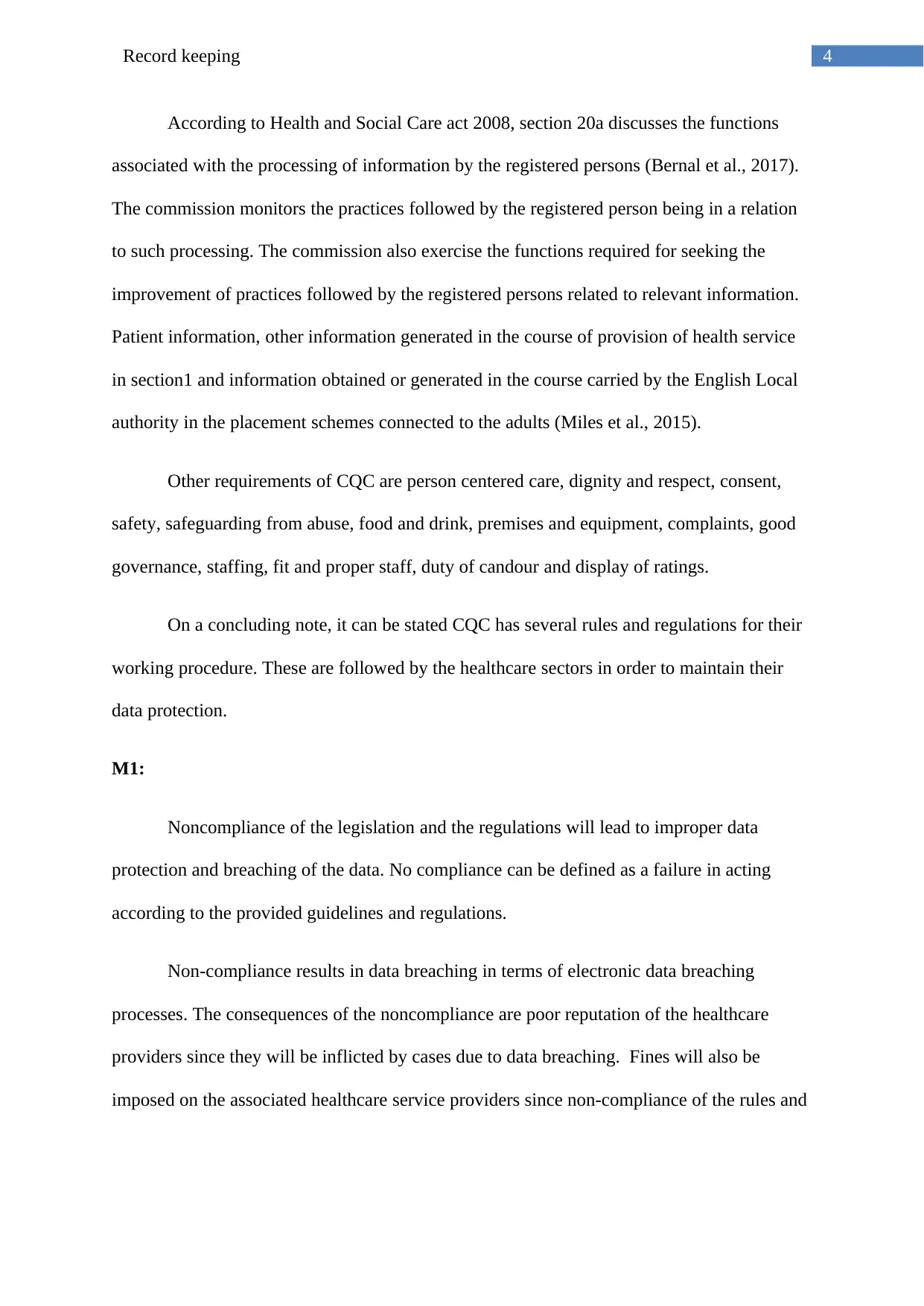
4Record keeping
According to Health and Social Care act 2008, section 20a discusses the functions
associated with the processing of information by the registered persons (Bernal et al., 2017).
The commission monitors the practices followed by the registered person being in a relation
to such processing. The commission also exercise the functions required for seeking the
improvement of practices followed by the registered persons related to relevant information.
Patient information, other information generated in the course of provision of health service
in section1 and information obtained or generated in the course carried by the English Local
authority in the placement schemes connected to the adults (Miles et al., 2015).
Other requirements of CQC are person centered care, dignity and respect, consent,
safety, safeguarding from abuse, food and drink, premises and equipment, complaints, good
governance, staffing, fit and proper staff, duty of candour and display of ratings.
On a concluding note, it can be stated CQC has several rules and regulations for their
working procedure. These are followed by the healthcare sectors in order to maintain their
data protection.
M1:
Noncompliance of the legislation and the regulations will lead to improper data
protection and breaching of the data. No compliance can be defined as a failure in acting
according to the provided guidelines and regulations.
Non-compliance results in data breaching in terms of electronic data breaching
processes. The consequences of the noncompliance are poor reputation of the healthcare
providers since they will be inflicted by cases due to data breaching. Fines will also be
imposed on the associated healthcare service providers since non-compliance of the rules and
According to Health and Social Care act 2008, section 20a discusses the functions
associated with the processing of information by the registered persons (Bernal et al., 2017).
The commission monitors the practices followed by the registered person being in a relation
to such processing. The commission also exercise the functions required for seeking the
improvement of practices followed by the registered persons related to relevant information.
Patient information, other information generated in the course of provision of health service
in section1 and information obtained or generated in the course carried by the English Local
authority in the placement schemes connected to the adults (Miles et al., 2015).
Other requirements of CQC are person centered care, dignity and respect, consent,
safety, safeguarding from abuse, food and drink, premises and equipment, complaints, good
governance, staffing, fit and proper staff, duty of candour and display of ratings.
On a concluding note, it can be stated CQC has several rules and regulations for their
working procedure. These are followed by the healthcare sectors in order to maintain their
data protection.
M1:
Noncompliance of the legislation and the regulations will lead to improper data
protection and breaching of the data. No compliance can be defined as a failure in acting
according to the provided guidelines and regulations.
Non-compliance results in data breaching in terms of electronic data breaching
processes. The consequences of the noncompliance are poor reputation of the healthcare
providers since they will be inflicted by cases due to data breaching. Fines will also be
imposed on the associated healthcare service providers since non-compliance of the rules and
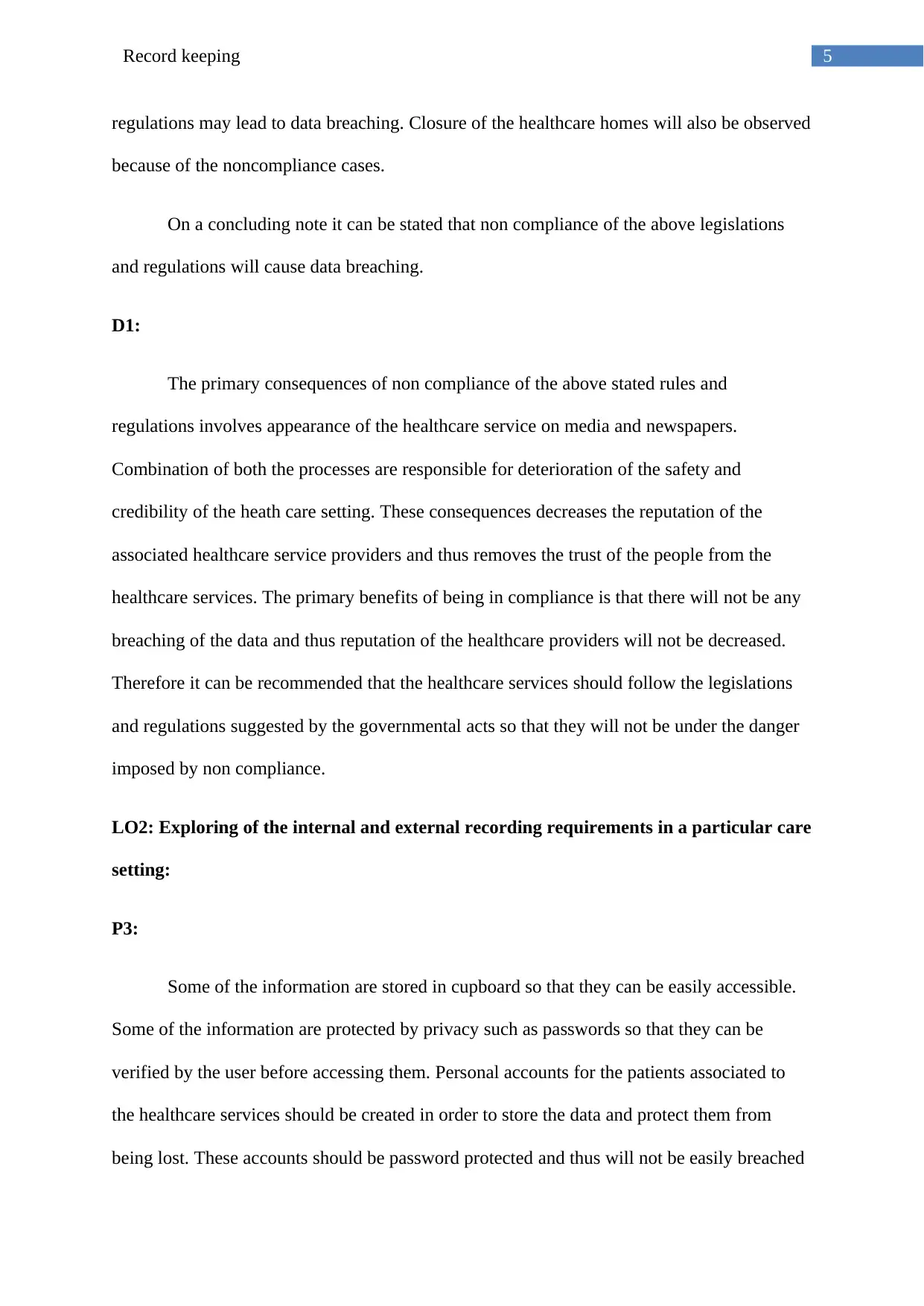
5Record keeping
regulations may lead to data breaching. Closure of the healthcare homes will also be observed
because of the noncompliance cases.
On a concluding note it can be stated that non compliance of the above legislations
and regulations will cause data breaching.
D1:
The primary consequences of non compliance of the above stated rules and
regulations involves appearance of the healthcare service on media and newspapers.
Combination of both the processes are responsible for deterioration of the safety and
credibility of the heath care setting. These consequences decreases the reputation of the
associated healthcare service providers and thus removes the trust of the people from the
healthcare services. The primary benefits of being in compliance is that there will not be any
breaching of the data and thus reputation of the healthcare providers will not be decreased.
Therefore it can be recommended that the healthcare services should follow the legislations
and regulations suggested by the governmental acts so that they will not be under the danger
imposed by non compliance.
LO2: Exploring of the internal and external recording requirements in a particular care
setting:
P3:
Some of the information are stored in cupboard so that they can be easily accessible.
Some of the information are protected by privacy such as passwords so that they can be
verified by the user before accessing them. Personal accounts for the patients associated to
the healthcare services should be created in order to store the data and protect them from
being lost. These accounts should be password protected and thus will not be easily breached
regulations may lead to data breaching. Closure of the healthcare homes will also be observed
because of the noncompliance cases.
On a concluding note it can be stated that non compliance of the above legislations
and regulations will cause data breaching.
D1:
The primary consequences of non compliance of the above stated rules and
regulations involves appearance of the healthcare service on media and newspapers.
Combination of both the processes are responsible for deterioration of the safety and
credibility of the heath care setting. These consequences decreases the reputation of the
associated healthcare service providers and thus removes the trust of the people from the
healthcare services. The primary benefits of being in compliance is that there will not be any
breaching of the data and thus reputation of the healthcare providers will not be decreased.
Therefore it can be recommended that the healthcare services should follow the legislations
and regulations suggested by the governmental acts so that they will not be under the danger
imposed by non compliance.
LO2: Exploring of the internal and external recording requirements in a particular care
setting:
P3:
Some of the information are stored in cupboard so that they can be easily accessible.
Some of the information are protected by privacy such as passwords so that they can be
verified by the user before accessing them. Personal accounts for the patients associated to
the healthcare services should be created in order to store the data and protect them from
being lost. These accounts should be password protected and thus will not be easily breached
⊘ This is a preview!⊘
Do you want full access?
Subscribe today to unlock all pages.

Trusted by 1+ million students worldwide
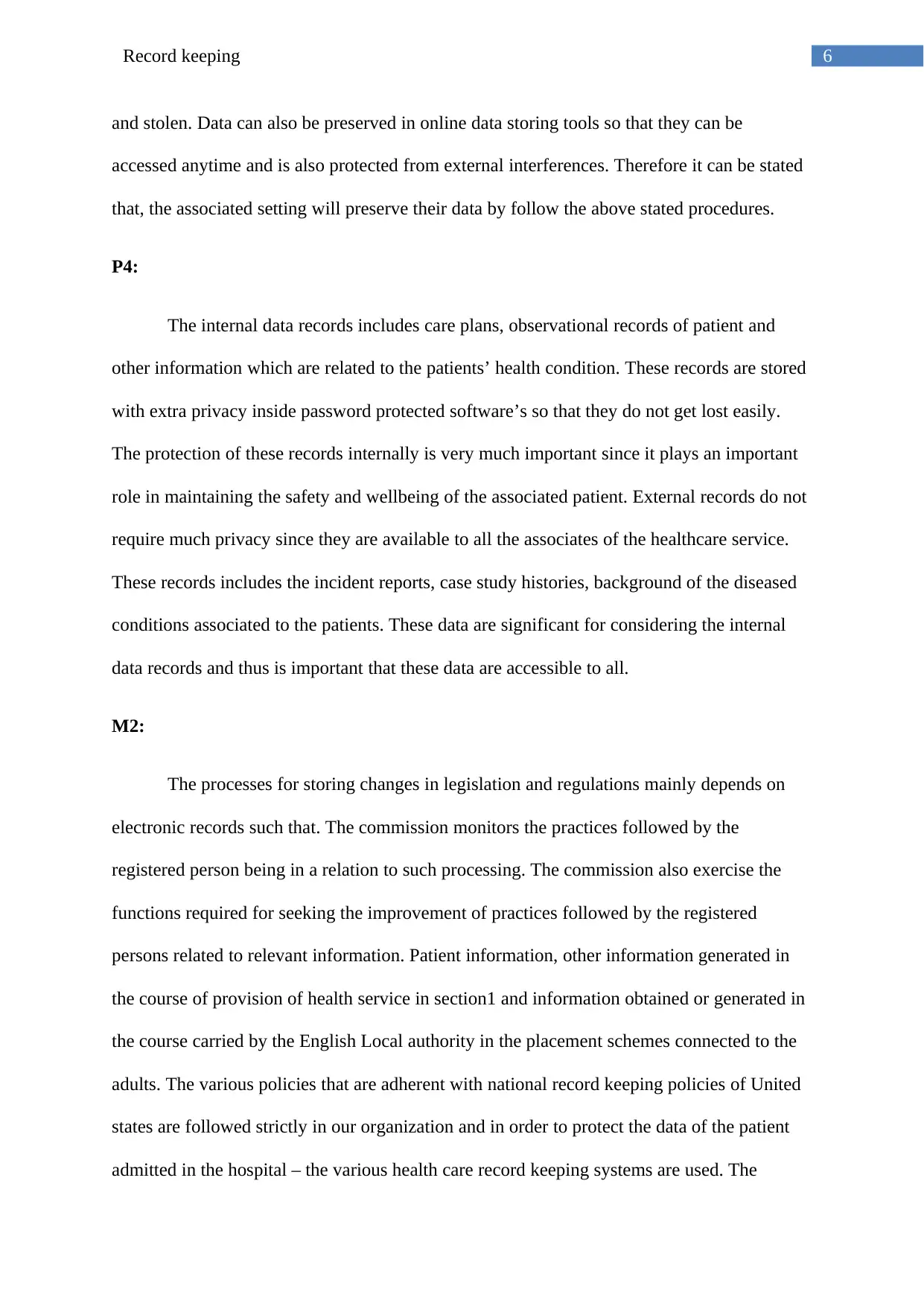
6Record keeping
and stolen. Data can also be preserved in online data storing tools so that they can be
accessed anytime and is also protected from external interferences. Therefore it can be stated
that, the associated setting will preserve their data by follow the above stated procedures.
P4:
The internal data records includes care plans, observational records of patient and
other information which are related to the patients’ health condition. These records are stored
with extra privacy inside password protected software’s so that they do not get lost easily.
The protection of these records internally is very much important since it plays an important
role in maintaining the safety and wellbeing of the associated patient. External records do not
require much privacy since they are available to all the associates of the healthcare service.
These records includes the incident reports, case study histories, background of the diseased
conditions associated to the patients. These data are significant for considering the internal
data records and thus is important that these data are accessible to all.
M2:
The processes for storing changes in legislation and regulations mainly depends on
electronic records such that. The commission monitors the practices followed by the
registered person being in a relation to such processing. The commission also exercise the
functions required for seeking the improvement of practices followed by the registered
persons related to relevant information. Patient information, other information generated in
the course of provision of health service in section1 and information obtained or generated in
the course carried by the English Local authority in the placement schemes connected to the
adults. The various policies that are adherent with national record keeping policies of United
states are followed strictly in our organization and in order to protect the data of the patient
admitted in the hospital – the various health care record keeping systems are used. The
and stolen. Data can also be preserved in online data storing tools so that they can be
accessed anytime and is also protected from external interferences. Therefore it can be stated
that, the associated setting will preserve their data by follow the above stated procedures.
P4:
The internal data records includes care plans, observational records of patient and
other information which are related to the patients’ health condition. These records are stored
with extra privacy inside password protected software’s so that they do not get lost easily.
The protection of these records internally is very much important since it plays an important
role in maintaining the safety and wellbeing of the associated patient. External records do not
require much privacy since they are available to all the associates of the healthcare service.
These records includes the incident reports, case study histories, background of the diseased
conditions associated to the patients. These data are significant for considering the internal
data records and thus is important that these data are accessible to all.
M2:
The processes for storing changes in legislation and regulations mainly depends on
electronic records such that. The commission monitors the practices followed by the
registered person being in a relation to such processing. The commission also exercise the
functions required for seeking the improvement of practices followed by the registered
persons related to relevant information. Patient information, other information generated in
the course of provision of health service in section1 and information obtained or generated in
the course carried by the English Local authority in the placement schemes connected to the
adults. The various policies that are adherent with national record keeping policies of United
states are followed strictly in our organization and in order to protect the data of the patient
admitted in the hospital – the various health care record keeping systems are used. The
Paraphrase This Document
Need a fresh take? Get an instant paraphrase of this document with our AI Paraphraser
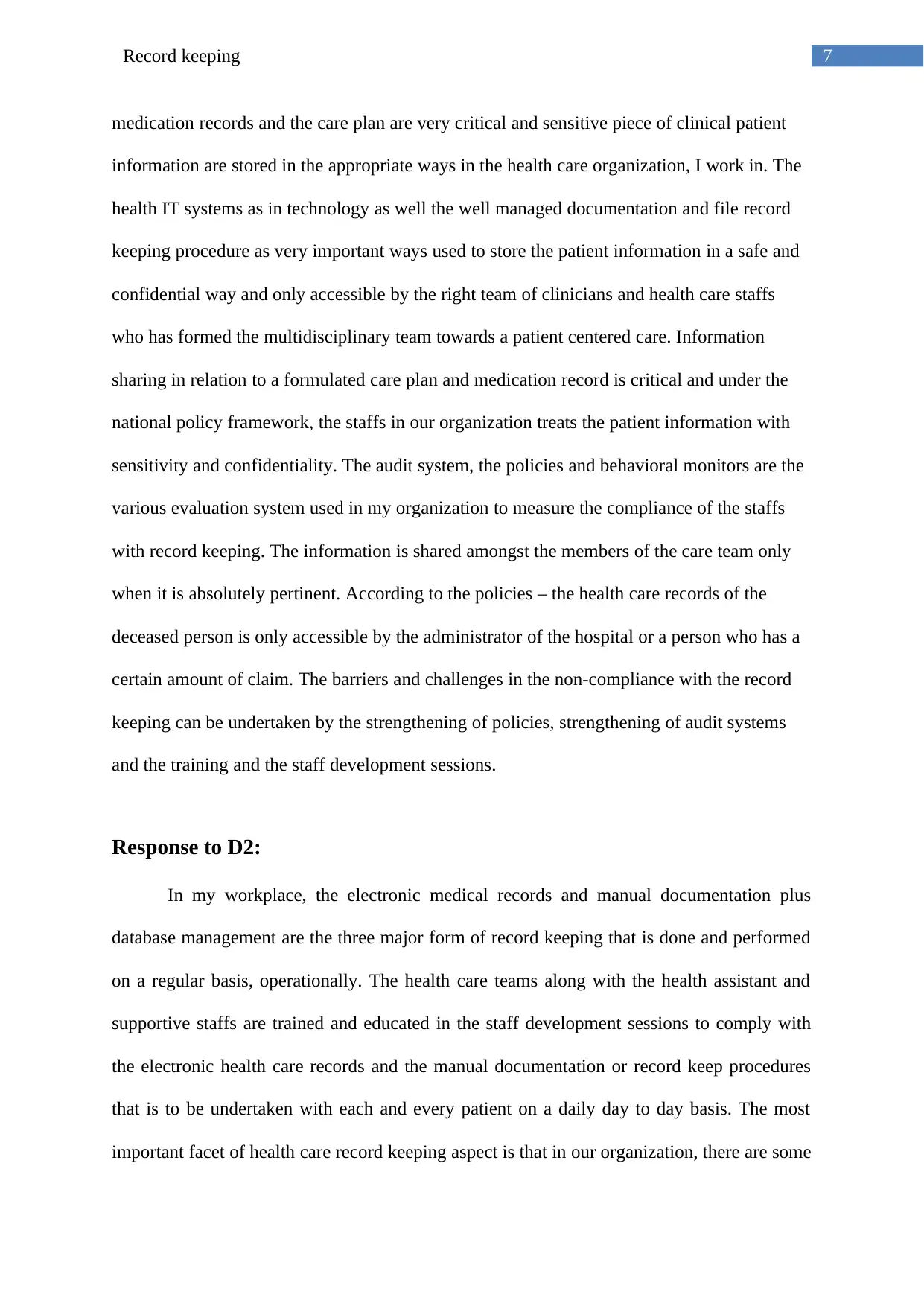
7Record keeping
medication records and the care plan are very critical and sensitive piece of clinical patient
information are stored in the appropriate ways in the health care organization, I work in. The
health IT systems as in technology as well the well managed documentation and file record
keeping procedure as very important ways used to store the patient information in a safe and
confidential way and only accessible by the right team of clinicians and health care staffs
who has formed the multidisciplinary team towards a patient centered care. Information
sharing in relation to a formulated care plan and medication record is critical and under the
national policy framework, the staffs in our organization treats the patient information with
sensitivity and confidentiality. The audit system, the policies and behavioral monitors are the
various evaluation system used in my organization to measure the compliance of the staffs
with record keeping. The information is shared amongst the members of the care team only
when it is absolutely pertinent. According to the policies – the health care records of the
deceased person is only accessible by the administrator of the hospital or a person who has a
certain amount of claim. The barriers and challenges in the non-compliance with the record
keeping can be undertaken by the strengthening of policies, strengthening of audit systems
and the training and the staff development sessions.
Response to D2:
In my workplace, the electronic medical records and manual documentation plus
database management are the three major form of record keeping that is done and performed
on a regular basis, operationally. The health care teams along with the health assistant and
supportive staffs are trained and educated in the staff development sessions to comply with
the electronic health care records and the manual documentation or record keep procedures
that is to be undertaken with each and every patient on a daily day to day basis. The most
important facet of health care record keeping aspect is that in our organization, there are some
medication records and the care plan are very critical and sensitive piece of clinical patient
information are stored in the appropriate ways in the health care organization, I work in. The
health IT systems as in technology as well the well managed documentation and file record
keeping procedure as very important ways used to store the patient information in a safe and
confidential way and only accessible by the right team of clinicians and health care staffs
who has formed the multidisciplinary team towards a patient centered care. Information
sharing in relation to a formulated care plan and medication record is critical and under the
national policy framework, the staffs in our organization treats the patient information with
sensitivity and confidentiality. The audit system, the policies and behavioral monitors are the
various evaluation system used in my organization to measure the compliance of the staffs
with record keeping. The information is shared amongst the members of the care team only
when it is absolutely pertinent. According to the policies – the health care records of the
deceased person is only accessible by the administrator of the hospital or a person who has a
certain amount of claim. The barriers and challenges in the non-compliance with the record
keeping can be undertaken by the strengthening of policies, strengthening of audit systems
and the training and the staff development sessions.
Response to D2:
In my workplace, the electronic medical records and manual documentation plus
database management are the three major form of record keeping that is done and performed
on a regular basis, operationally. The health care teams along with the health assistant and
supportive staffs are trained and educated in the staff development sessions to comply with
the electronic health care records and the manual documentation or record keep procedures
that is to be undertaken with each and every patient on a daily day to day basis. The most
important facet of health care record keeping aspect is that in our organization, there are some
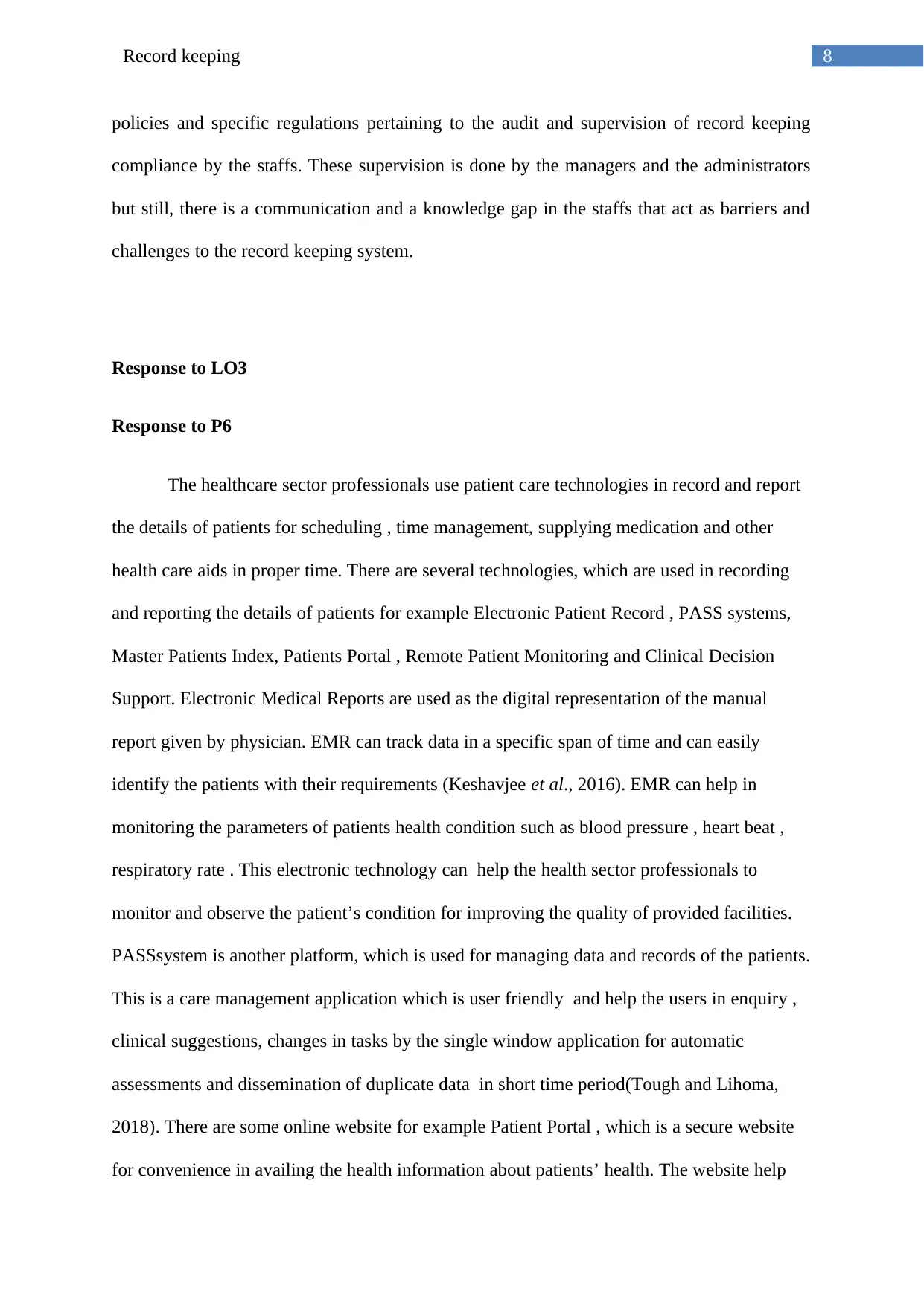
8Record keeping
policies and specific regulations pertaining to the audit and supervision of record keeping
compliance by the staffs. These supervision is done by the managers and the administrators
but still, there is a communication and a knowledge gap in the staffs that act as barriers and
challenges to the record keeping system.
Response to LO3
Response to P6
The healthcare sector professionals use patient care technologies in record and report
the details of patients for scheduling , time management, supplying medication and other
health care aids in proper time. There are several technologies, which are used in recording
and reporting the details of patients for example Electronic Patient Record , PASS systems,
Master Patients Index, Patients Portal , Remote Patient Monitoring and Clinical Decision
Support. Electronic Medical Reports are used as the digital representation of the manual
report given by physician. EMR can track data in a specific span of time and can easily
identify the patients with their requirements (Keshavjee et al., 2016). EMR can help in
monitoring the parameters of patients health condition such as blood pressure , heart beat ,
respiratory rate . This electronic technology can help the health sector professionals to
monitor and observe the patient’s condition for improving the quality of provided facilities.
PASSsystem is another platform, which is used for managing data and records of the patients.
This is a care management application which is user friendly and help the users in enquiry ,
clinical suggestions, changes in tasks by the single window application for automatic
assessments and dissemination of duplicate data in short time period(Tough and Lihoma,
2018). There are some online website for example Patient Portal , which is a secure website
for convenience in availing the health information about patients’ health. The website help
policies and specific regulations pertaining to the audit and supervision of record keeping
compliance by the staffs. These supervision is done by the managers and the administrators
but still, there is a communication and a knowledge gap in the staffs that act as barriers and
challenges to the record keeping system.
Response to LO3
Response to P6
The healthcare sector professionals use patient care technologies in record and report
the details of patients for scheduling , time management, supplying medication and other
health care aids in proper time. There are several technologies, which are used in recording
and reporting the details of patients for example Electronic Patient Record , PASS systems,
Master Patients Index, Patients Portal , Remote Patient Monitoring and Clinical Decision
Support. Electronic Medical Reports are used as the digital representation of the manual
report given by physician. EMR can track data in a specific span of time and can easily
identify the patients with their requirements (Keshavjee et al., 2016). EMR can help in
monitoring the parameters of patients health condition such as blood pressure , heart beat ,
respiratory rate . This electronic technology can help the health sector professionals to
monitor and observe the patient’s condition for improving the quality of provided facilities.
PASSsystem is another platform, which is used for managing data and records of the patients.
This is a care management application which is user friendly and help the users in enquiry ,
clinical suggestions, changes in tasks by the single window application for automatic
assessments and dissemination of duplicate data in short time period(Tough and Lihoma,
2018). There are some online website for example Patient Portal , which is a secure website
for convenience in availing the health information about patients’ health. The website help
⊘ This is a preview!⊘
Do you want full access?
Subscribe today to unlock all pages.

Trusted by 1+ million students worldwide
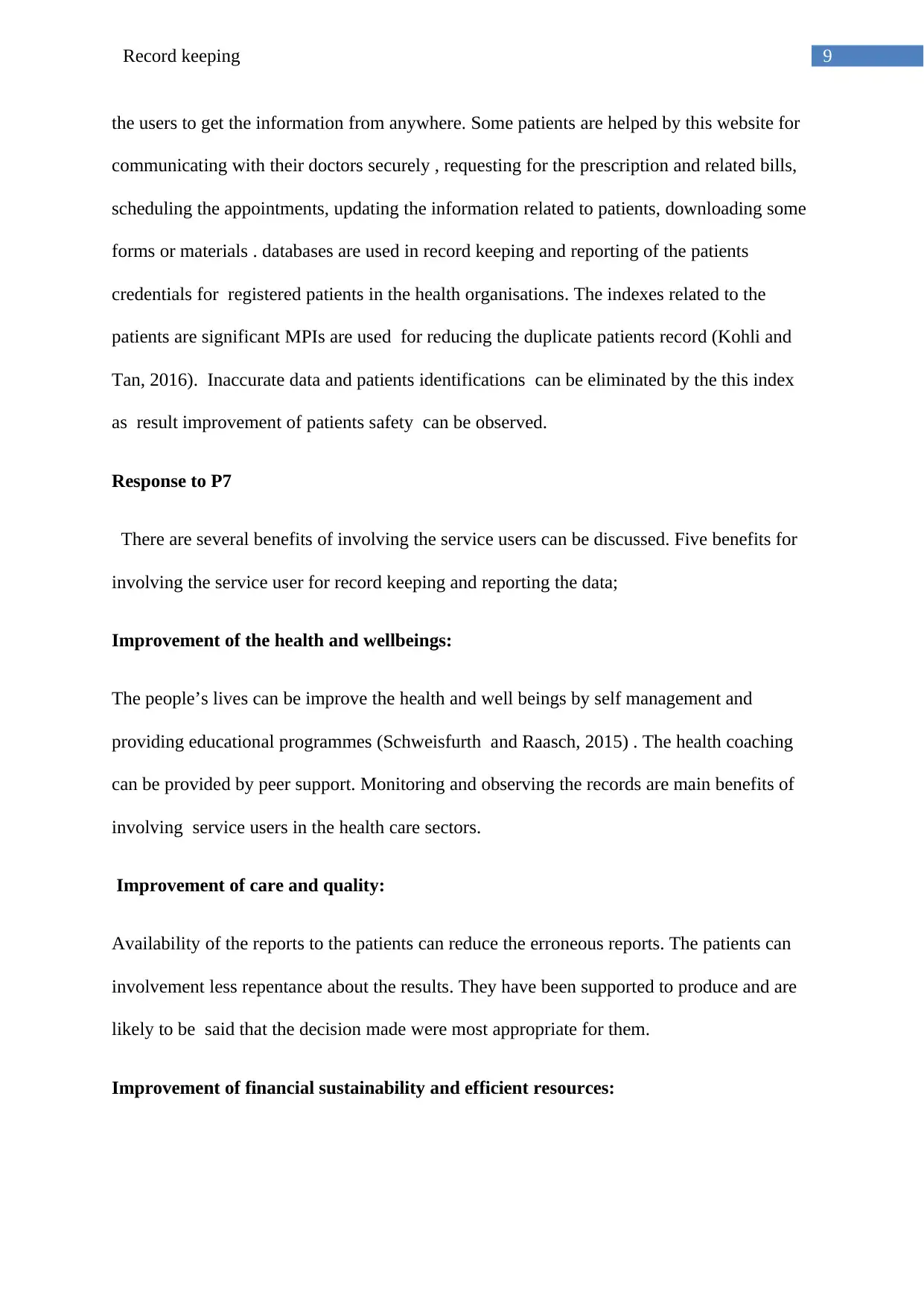
9Record keeping
the users to get the information from anywhere. Some patients are helped by this website for
communicating with their doctors securely , requesting for the prescription and related bills,
scheduling the appointments, updating the information related to patients, downloading some
forms or materials . databases are used in record keeping and reporting of the patients
credentials for registered patients in the health organisations. The indexes related to the
patients are significant MPIs are used for reducing the duplicate patients record (Kohli and
Tan, 2016). Inaccurate data and patients identifications can be eliminated by the this index
as result improvement of patients safety can be observed.
Response to P7
There are several benefits of involving the service users can be discussed. Five benefits for
involving the service user for record keeping and reporting the data;
Improvement of the health and wellbeings:
The people’s lives can be improve the health and well beings by self management and
providing educational programmes (Schweisfurth and Raasch, 2015) . The health coaching
can be provided by peer support. Monitoring and observing the records are main benefits of
involving service users in the health care sectors.
Improvement of care and quality:
Availability of the reports to the patients can reduce the erroneous reports. The patients can
involvement less repentance about the results. They have been supported to produce and are
likely to be said that the decision made were most appropriate for them.
Improvement of financial sustainability and efficient resources:
the users to get the information from anywhere. Some patients are helped by this website for
communicating with their doctors securely , requesting for the prescription and related bills,
scheduling the appointments, updating the information related to patients, downloading some
forms or materials . databases are used in record keeping and reporting of the patients
credentials for registered patients in the health organisations. The indexes related to the
patients are significant MPIs are used for reducing the duplicate patients record (Kohli and
Tan, 2016). Inaccurate data and patients identifications can be eliminated by the this index
as result improvement of patients safety can be observed.
Response to P7
There are several benefits of involving the service users can be discussed. Five benefits for
involving the service user for record keeping and reporting the data;
Improvement of the health and wellbeings:
The people’s lives can be improve the health and well beings by self management and
providing educational programmes (Schweisfurth and Raasch, 2015) . The health coaching
can be provided by peer support. Monitoring and observing the records are main benefits of
involving service users in the health care sectors.
Improvement of care and quality:
Availability of the reports to the patients can reduce the erroneous reports. The patients can
involvement less repentance about the results. They have been supported to produce and are
likely to be said that the decision made were most appropriate for them.
Improvement of financial sustainability and efficient resources:
Paraphrase This Document
Need a fresh take? Get an instant paraphrase of this document with our AI Paraphraser
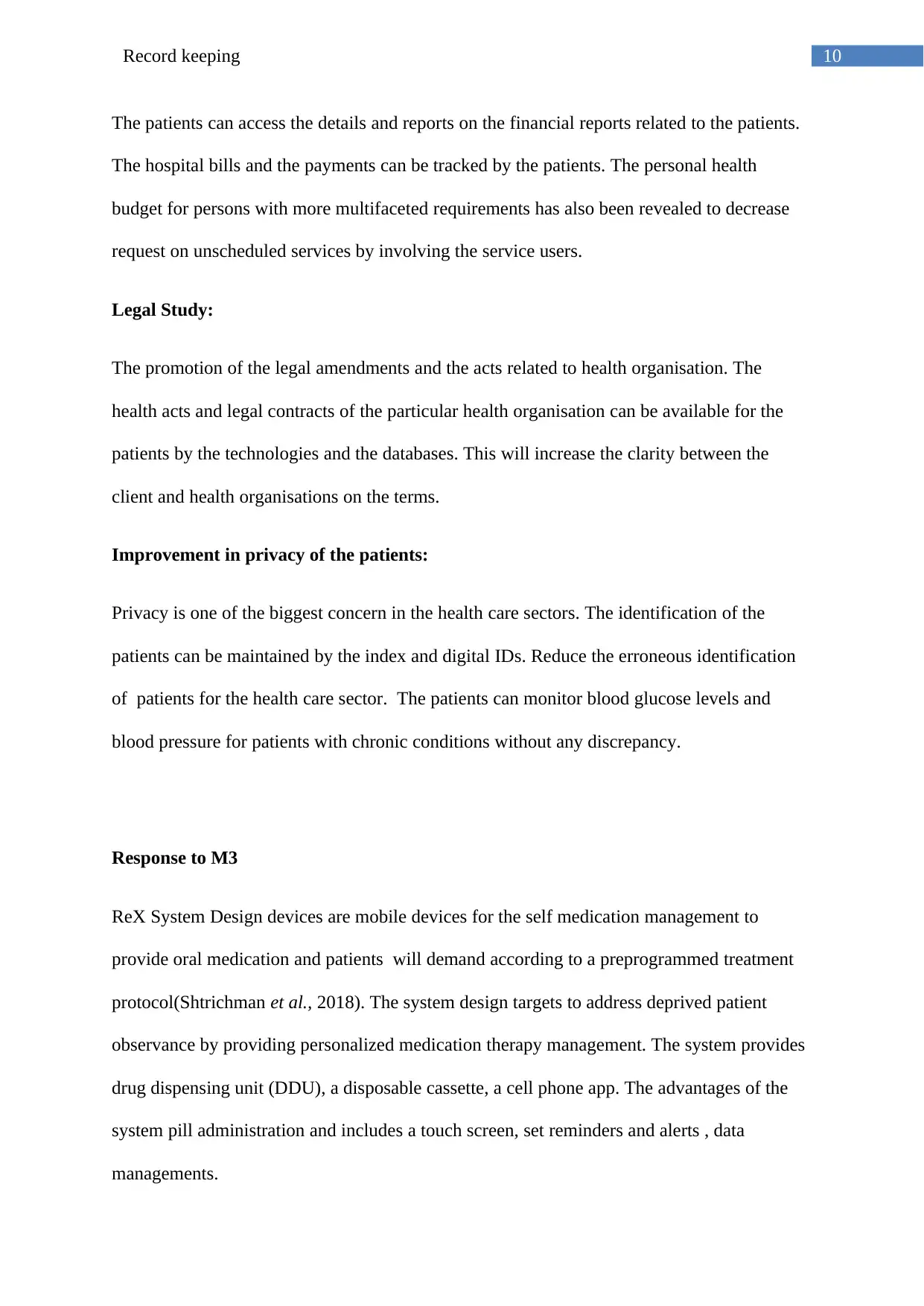
10Record keeping
The patients can access the details and reports on the financial reports related to the patients.
The hospital bills and the payments can be tracked by the patients. The personal health
budget for persons with more multifaceted requirements has also been revealed to decrease
request on unscheduled services by involving the service users.
Legal Study:
The promotion of the legal amendments and the acts related to health organisation. The
health acts and legal contracts of the particular health organisation can be available for the
patients by the technologies and the databases. This will increase the clarity between the
client and health organisations on the terms.
Improvement in privacy of the patients:
Privacy is one of the biggest concern in the health care sectors. The identification of the
patients can be maintained by the index and digital IDs. Reduce the erroneous identification
of patients for the health care sector. The patients can monitor blood glucose levels and
blood pressure for patients with chronic conditions without any discrepancy.
Response to M3
ReX System Design devices are mobile devices for the self medication management to
provide oral medication and patients will demand according to a preprogrammed treatment
protocol(Shtrichman et al., 2018). The system design targets to address deprived patient
observance by providing personalized medication therapy management. The system provides
drug dispensing unit (DDU), a disposable cassette, a cell phone app. The advantages of the
system pill administration and includes a touch screen, set reminders and alerts , data
managements.
The patients can access the details and reports on the financial reports related to the patients.
The hospital bills and the payments can be tracked by the patients. The personal health
budget for persons with more multifaceted requirements has also been revealed to decrease
request on unscheduled services by involving the service users.
Legal Study:
The promotion of the legal amendments and the acts related to health organisation. The
health acts and legal contracts of the particular health organisation can be available for the
patients by the technologies and the databases. This will increase the clarity between the
client and health organisations on the terms.
Improvement in privacy of the patients:
Privacy is one of the biggest concern in the health care sectors. The identification of the
patients can be maintained by the index and digital IDs. Reduce the erroneous identification
of patients for the health care sector. The patients can monitor blood glucose levels and
blood pressure for patients with chronic conditions without any discrepancy.
Response to M3
ReX System Design devices are mobile devices for the self medication management to
provide oral medication and patients will demand according to a preprogrammed treatment
protocol(Shtrichman et al., 2018). The system design targets to address deprived patient
observance by providing personalized medication therapy management. The system provides
drug dispensing unit (DDU), a disposable cassette, a cell phone app. The advantages of the
system pill administration and includes a touch screen, set reminders and alerts , data
managements.
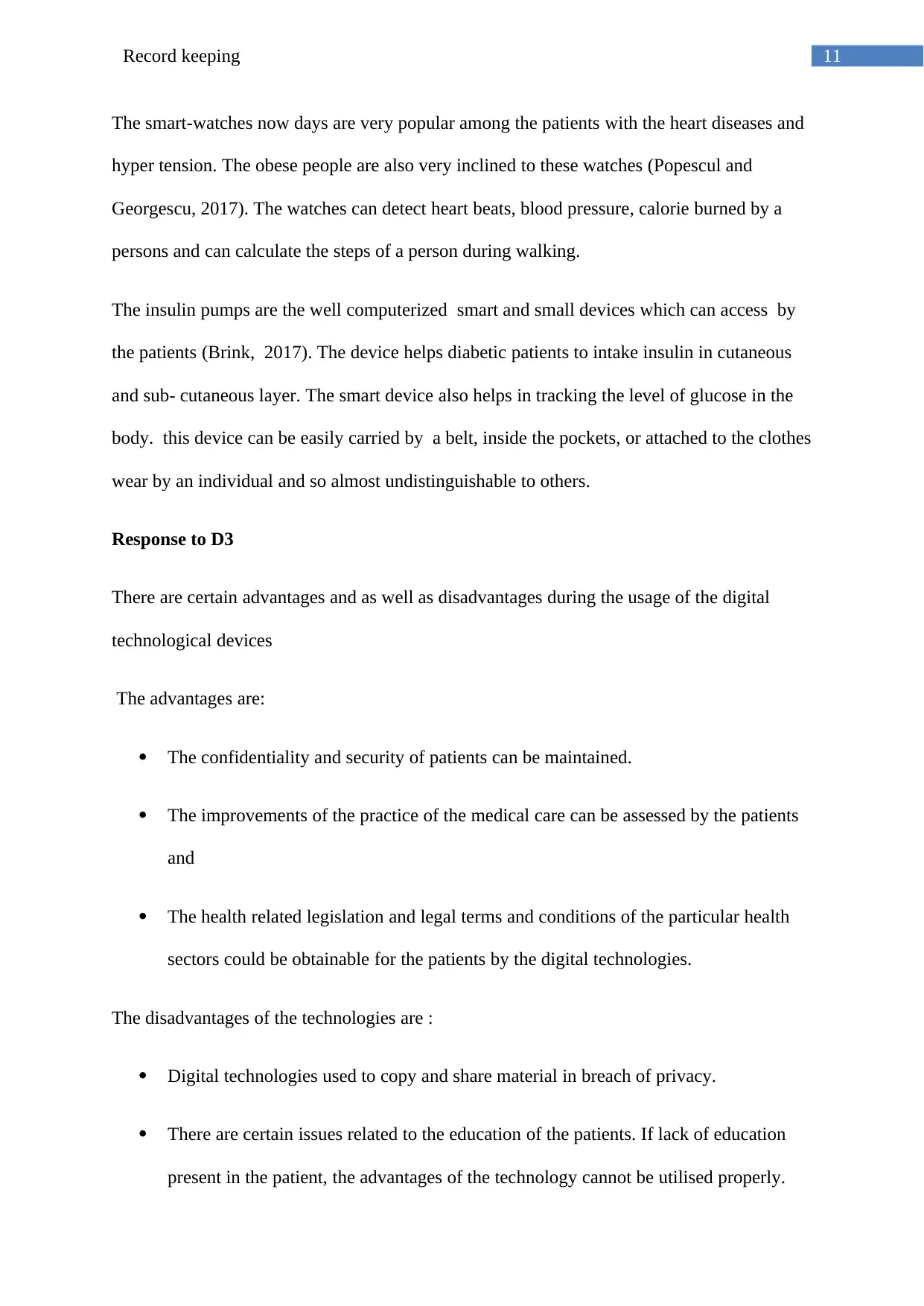
11Record keeping
The smart-watches now days are very popular among the patients with the heart diseases and
hyper tension. The obese people are also very inclined to these watches (Popescul and
Georgescu, 2017). The watches can detect heart beats, blood pressure, calorie burned by a
persons and can calculate the steps of a person during walking.
The insulin pumps are the well computerized smart and small devices which can access by
the patients (Brink, 2017). The device helps diabetic patients to intake insulin in cutaneous
and sub- cutaneous layer. The smart device also helps in tracking the level of glucose in the
body. this device can be easily carried by a belt, inside the pockets, or attached to the clothes
wear by an individual and so almost undistinguishable to others.
Response to D3
There are certain advantages and as well as disadvantages during the usage of the digital
technological devices
The advantages are:
The confidentiality and security of patients can be maintained.
The improvements of the practice of the medical care can be assessed by the patients
and
The health related legislation and legal terms and conditions of the particular health
sectors could be obtainable for the patients by the digital technologies.
The disadvantages of the technologies are :
Digital technologies used to copy and share material in breach of privacy.
There are certain issues related to the education of the patients. If lack of education
present in the patient, the advantages of the technology cannot be utilised properly.
The smart-watches now days are very popular among the patients with the heart diseases and
hyper tension. The obese people are also very inclined to these watches (Popescul and
Georgescu, 2017). The watches can detect heart beats, blood pressure, calorie burned by a
persons and can calculate the steps of a person during walking.
The insulin pumps are the well computerized smart and small devices which can access by
the patients (Brink, 2017). The device helps diabetic patients to intake insulin in cutaneous
and sub- cutaneous layer. The smart device also helps in tracking the level of glucose in the
body. this device can be easily carried by a belt, inside the pockets, or attached to the clothes
wear by an individual and so almost undistinguishable to others.
Response to D3
There are certain advantages and as well as disadvantages during the usage of the digital
technological devices
The advantages are:
The confidentiality and security of patients can be maintained.
The improvements of the practice of the medical care can be assessed by the patients
and
The health related legislation and legal terms and conditions of the particular health
sectors could be obtainable for the patients by the digital technologies.
The disadvantages of the technologies are :
Digital technologies used to copy and share material in breach of privacy.
There are certain issues related to the education of the patients. If lack of education
present in the patient, the advantages of the technology cannot be utilised properly.
⊘ This is a preview!⊘
Do you want full access?
Subscribe today to unlock all pages.

Trusted by 1+ million students worldwide
1 out of 20
Related Documents
Your All-in-One AI-Powered Toolkit for Academic Success.
+13062052269
info@desklib.com
Available 24*7 on WhatsApp / Email
![[object Object]](/_next/static/media/star-bottom.7253800d.svg)
Unlock your academic potential
Copyright © 2020–2026 A2Z Services. All Rights Reserved. Developed and managed by ZUCOL.





